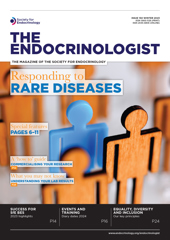Aled Rees is Professor of Endocrinology and Consultant Endocrinologist at Cardiff University’s School of Medicine. Aled’s clinical practice spans all aspects of endocrinology, with a particular focus on neuroendocrinology. He is currently researching the impact of the hormonal environment in early life on cognition and neurodevelopment.
Professor Rees was chosen by the membership as the Society’s new General Secretary-Elect, and began his term of office at the Annual General Meeting during this year’s SfE BES conference. We took the opportunity to talk to him about his career and his perspective on our discipline.
What attracted you to endocrinology?
I enjoyed all my rotations as an undergraduate and junior doctor, but eventually settled on a career as a physician. I very nearly became a rheumatologist, but chose endocrinology when working as a senior house officer with Professor Maurice Scanlon. In those days, patients were brought into the ward for many dynamic tests, so we had the opportunity to see endocrine conditions first-hand. I liked the diversity of the presentations, the problem-solving element, and the academic nature of the discipline.
'[I] have really valued opportunities to work with patient support organisations, to help develop services and establish research priorities.'
What are you proudest of in your career?
It’s been a privilege to contribute in a small way to the development of young endocrinologists and scientists. I’ve enjoyed working with endocrine trainees and supervising undergraduate, PhD and MD projects. I’ve also been inspired by patients, and have really valued opportunities to work with patient support organisations, to help develop services and establish research priorities. On the academic side, I’ve been proud to take part in ‘real-world’ data projects and clinical trials which have led to changes in clinical practice and the development of new treatments.
How did you first get involved with the Society?
I was fortunate to secure funding for my PhD from a Society for Endocrinology Clinical Endocrinology Trust Fellowship (now known as the Clinical Endocrinology Journal Foundation). I was really grateful for this opportunity, and my career might have been very different without this support. I subsequently got involved in Society-supported initiatives (such as CaHASE (the Congenital Adrenal Hyperplasia Adult Study Executive) and the Acromegaly Project), and served on the Society’s Clinical Committee, Finance Committee and Council.
What challenges face the Society and endocrinology in general?
There’s no escaping the fact that we live in financially difficult times. The Society has the challenge of balancing financial prudence with the need to deliver on its numerous activities and its mission to enhance our discipline. However, I know from my previous experience of working on Council that it has strong leadership and expertise in place to deliver on these objectives.
The pressures on clinical services, training and science are also very real. We have to make sure that we work together as a community to share ideas, raise our profile and promote activity through collaboration.
What are the most exciting opportunities for the Society?
Our biggest strength is our collective ability. The breadth and quality of work presented by our scientists, young endocrinologists, nurses and healthcare professionals at the recent SfE BES conference were impressive and inspiring. If we can get better at working collaboratively, there is real opportunity in the UK to take advantage of some our ‘unique selling points’ such as the NHS, big data, the NIHR Clinical Research Network, and genomic initiatives, to enhance our position as a leading endocrine community on the world stage.
What do you hope to achieve during your term as General Secretary?
First and foremost, I’d like to pay tribute to my predecessor, Professor Ruth Andrew, who has been a superb General Secretary over the last few years. I’m looking forward to working with her in an initial ‘shadow’ role. We already have a large, thriving community, but I would like to help drive a continued expansion of our membership. I’m also keen to see the great work that has been undertaken in recent years on the Society’s new governance structure, on equality, diversity and inclusion, and on revised grants schemes, delivered and developed further.
‘The recent governance review placed a great deal of emphasis on transparency, inclusivity and engagement.’
Why should members get involved with the Society’s governance?
I had the privilege of seeing the work that the Society undertook in delivering meetings such as the SfE BES conference and Endocrine Academy, and I felt the need to contribute in some way. I have learnt a great deal from working with highly skilled colleagues at the Society in various roles. I enjoyed helping contribute to many national initiatives but also benefited from gaining new knowledge, which I have used to help shape endocrine services in my own practice. The recent governance review placed a great deal of emphasis on transparency, inclusivity and engagement. I would strongly encourage others to apply for committee vacancies, so that they can benefit in the same ways that I have done, and so that the Society can maximise representation from the diversity of its membership.






